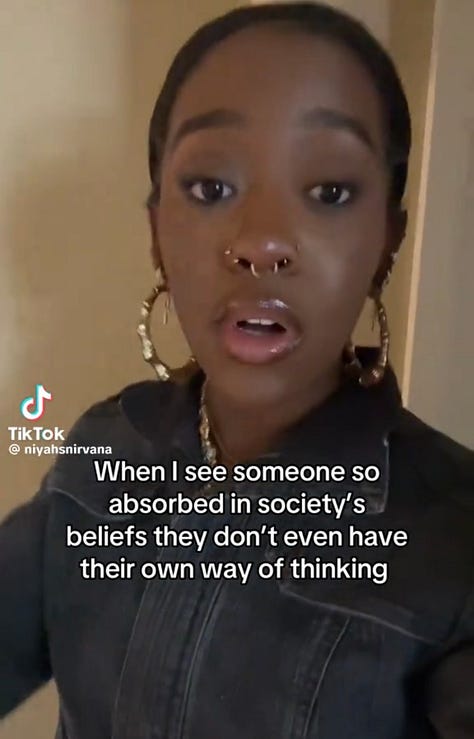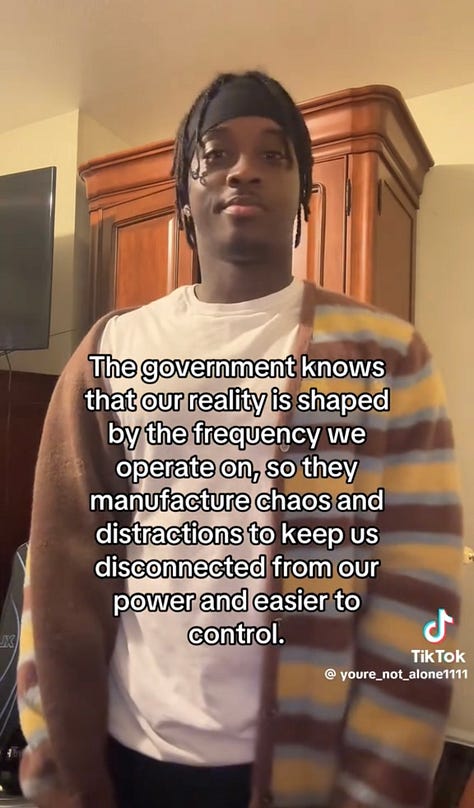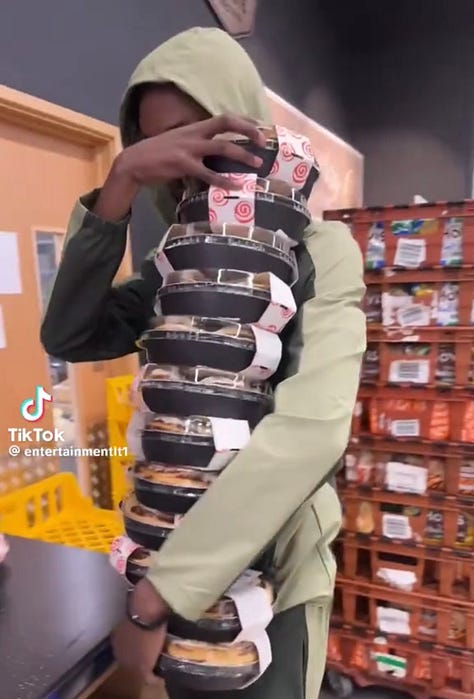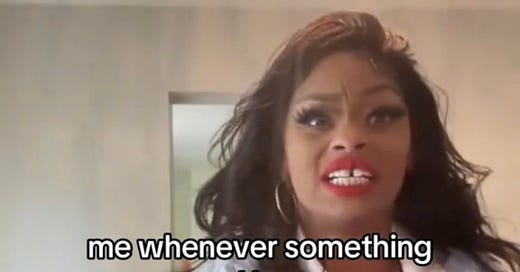A new viral TikTok sound featuring Tokyo Toni shouting, "You are under spells, people!" is currently trending. People are using the sound to highlight the bizarre, problematic, or downright confusing behaviours they believe show someone is “under spells”(God forbid). What first seemed like a funny, exaggerated outburst has morphed into a chilling truth. As I watched more videos, I started analysing the examples people posted, and I realised they were on to something. The things they pointed out and the conversations they were mocking all felt very familiar. I began reflecting on what I would say. Honestly, I could list hundreds. From the endless stream of clueless podcasters still debating whether light-skinned or dark-skinned women are "better" (are we not exhausted yet?) to the never-ending 50/50 "who pays on the first date" arguments still raging on social media in 2025.
The phrase captures an unsettling reality: many people today, particularly within Black communities, are caught under psychological, cultural, and spiritual "spells"—trapped by manipulative forces they neither recognise nor understand.
So what spells are we under?
Take the recent Tesco cinnamon bun fiasco: all it took was for one creator to say, "This is the best thing I’ve ever eaten," and within days, Tesco shelves were cleared. People were queuing up and buying eight packets at a time! Like I said, under spells. At that moment, I thought to myself, We really are some of the easiest people to hoodwink. How can we be so easily influenced?
Modern "spells" manifest in subtle, everyday ways. They can be seen in the romanticisation of toxic relationships as "ride or die" loyalty, obsession with status symbols, status over emotional wealth, and the confusion of personal branding with actual identity. Trauma becomes a personality trait; wealth is equated with worthiness, and aesthetics become confused for substance. These patterns encourage us to measure our lives by shallow, externally validated standards rather than internal fulfilment or community impact. All the while, our real experiences, struggles, and histories are flattened into content to be scrolled past. In this way, oppression is packaged as entertainment, trauma is monetised, and identity is fractured into easily consumable content.
Modern-day "spells" don't need any hocus-pocus. It just needs the relentless psychological conditioning of social media, the education system, and the cultural messages we absorb without question. The hoodwinking of Black minds has simply been upgraded: no longer through blunt force, but through hashtags, screens, and viral trends.
A Long History of Miseducation



Historically, the manipulation of Black consciousness is nothing new. Carter G. Woodson, in The Mis-Education of the Negro (1933), explained how the educational system intentionally marginalised and distorted Black history and culture. Woodson warned that a miseducated Black person would voluntarily seek inferiority, believing it was their natural place. Today, the methods of miseducation have expanded beyond schools and into mass media; it’s now the music and the influencers where distorted narratives about Black life are constantly reinforced.
Malcolm X's warning about the media’s power to control the minds of the masses rings truer than ever. Social media has replaced traditional news outlets, but the goal remains the same: to control the image and public perception of Blackness through stereotypes of dysfunction and hypersexuality, leaving little room for the complex and diverse realities of Black lives.
Algorithms, Algorithms
The rise of algorithms in digital spaces has only intensified this manipulation. Black culture has always been one of the biggest drivers of global trends. Yet today, Black creativity is extracted, commodified, and weaponised for profit, often against the very communities that birthed it. Algorithms, programmed to maximise engagement, prioritise controversy, outrage, and division. Educational, reflective content? Buried.
Even movements that initially offered liberation and were meant to set us free have also been co-opted into tools of manipulation. The "soft life" movement, a rebellion against struggle and hardship which originally celebrated Black people's right to ease and joy, has been reduced to an aesthetic contest. Instead of promoting healing and rest, it now often pressures individuals, especially young Black women, to perform a life of luxury, beauty, and curated happiness by the age of 23, which is painfully unrealistic. These distorted movements trap individuals in toxic cycles of performative perfection, distracting them from meaningful collective healing and systemic change with the latest Lululemon drop.
The Death of Discernment
At the root of all this is a deep crisis of discernment. Critical thinking, the ability to pause, question, analyse, and resist, is being quietly destroyed by a culture of constant stimulation and superficial engagement. In this digital reality, the loudest voices appear the most credible, virality is mistaken for truth, and spectacle overshadows substance. Sociologist Neil Postman’s warning that we are "amusing ourselves to death" has materialised fully in this social media era.
Complex realities are reduced to trending hashtags and 30-second videos. Our attention spans are crumbling by the day, and our ability to sit with complex realities is slipping away. All the while deep thought, real knowledge and genuine understanding are sacrificed on the altar of entertainment made up of quick hits and empty spectacle.
Economic and political "spells" keep us disconnected also. Look at Black America's collective buying power, which is topping a trillion dollars, and yet the wealth gap barely moves. Instead of real solutions, you're sold more consumption, with freedom repackaged as buying luxury goods.
Political engagement often stops at empty gestures, corporate statements, or election-season shoutouts, without real change. As Keeanga-Yamahtta Taylor notes, Black struggles are used for votes, not transformation. Our energy is drained by performance, not progress.
Breaking the Spells
It is crucial to recognise who benefits from this widespread disconnection. Who is profiting from our disconnection? And I think the answer is clear.
Systems of oppression are strengthened when our communities are divided and distracted. Every argument over gender dynamics on TikTok, every pound spent chasing clout, and every ounce of energy defending toxic ideologies serves to weaken the possibility of real collective action. Every minute we spend defending foolishness strengthens the very forces that want us powerless.
W.E.B. Du Bois's concept of "double consciousness" refers to the experience of a person who is forced to view themselves through the eyes of others and also through their own perspective. Today, this has been amplified by social media and its digital mirrors that distort and fragment identity further, deepening alienation and disempowerment that fragment our self even further.
Yet the power to break these spells lies within reach, and I think it's time we wake up and remember who we are without all the noise.
Historically, Black communities have continually endured the unspeakable and still demonstrated resilience, creativity, and revolutionary potential in the face of overwhelming odds. Awakening requires intentional action, real education that tells the full truth of Black histories and futures; economic strategies that prioritise collective wealth-building; and political consciousness that moves beyond performative activism and chasing clout toward structural change.
Awakening demands that we slow down, reflect, and act with discernment in a world designed to overstimulate and manipulate.
The words of Tokyo Toni, “You are under spells, people!” to me are an urgent call to consciousness. It demands that we interrogate who and what is shaping our perceptions, values, and futures. It challenges us to choose self-awareness over distraction, critical thought over reaction, and collective liberation over individual performance.
As a people we have survived too much to now surrender to distraction, delusion and disillusion.
To fall now, not by force but by simply forgetting, would be the greatest tragedy and I'll be damned if we stay spellbound.




spitting fire all the way through this piece. 🙏🏾✨